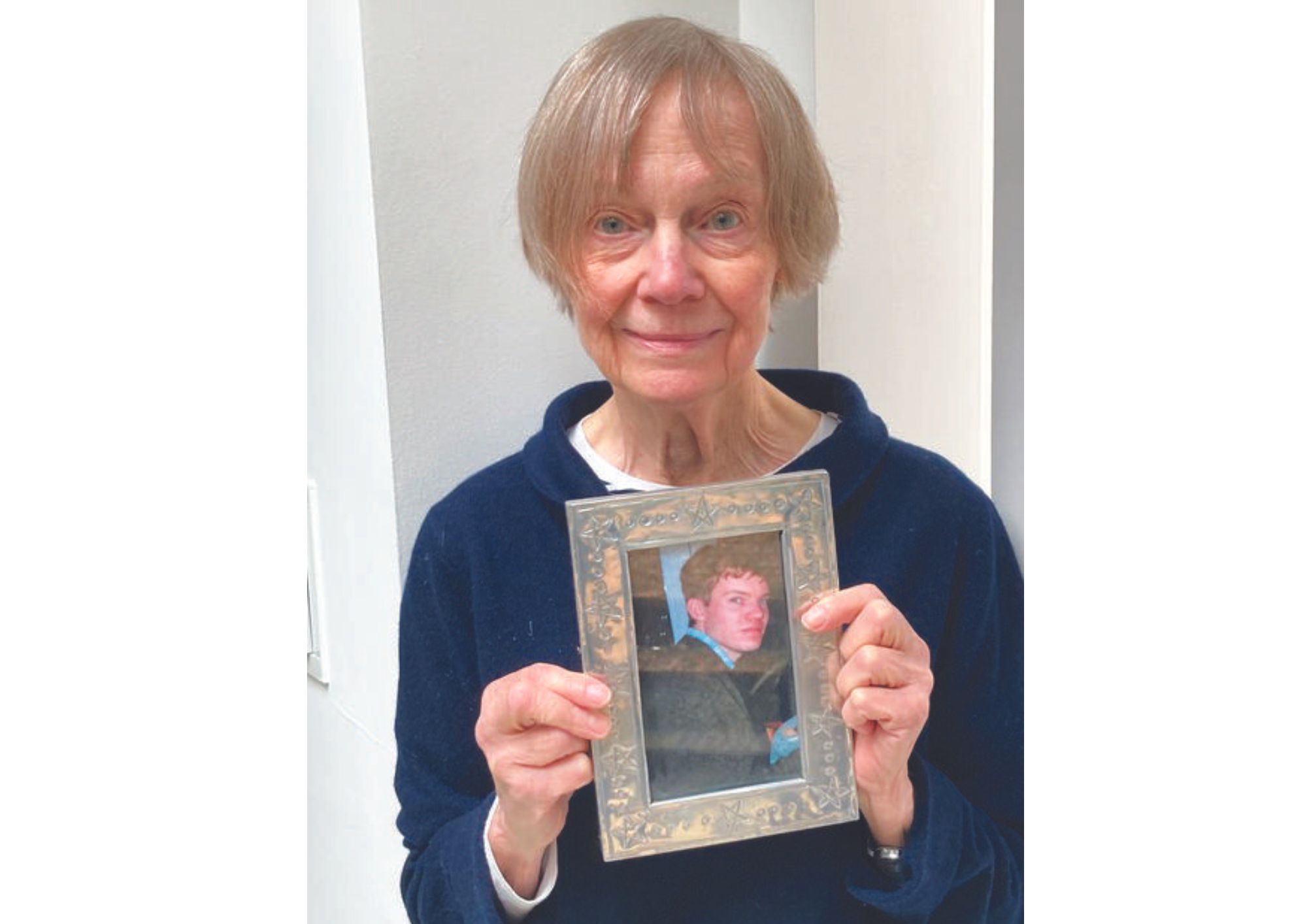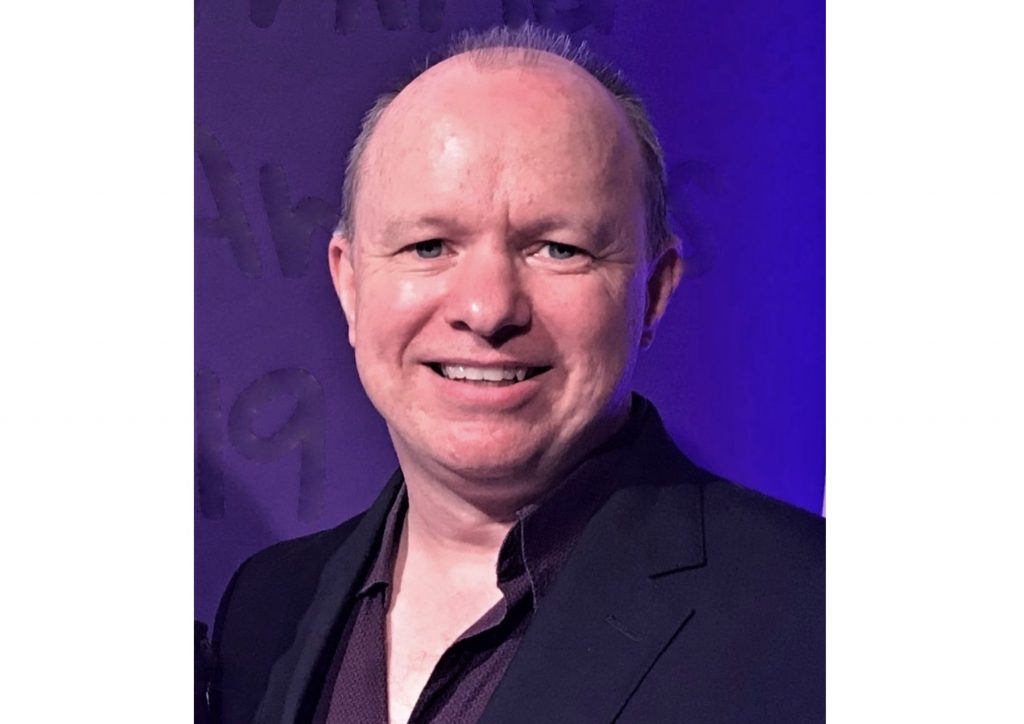‘Stigma of a schizophrenia diagnosis only makes it harder to help sufferers’
Mental Health Awareness: Charity set up in name of 27-year-old who took his own life
Friday, 19th May 2023 — By Charlotte Chambers

Virginia Low with a photograph of her late son, Stuart

“I DIDN’T think of him as a seriously terminally ill person,” Virginia Low says of the day she said goodbye to her son as she flew to family in the United States. “I felt he was doing better. I was absolutely confident that he was going to overcome his difficulties, one way or another.”
But he wasn’t. It was February 1997 and just days after she left, Stuart Low took his own life. He had been diagnosed as schizophrenic a year or two earlier, after he began hearing voices while studying in Texas.
Of his “label,” his mother admits “depression would have been a much easier diagnosis to live with and easier to share with other people,” and wonders whether it was entirely necessary.
The voices never went away. Instead, they intensified and became a negative cycle of thoughts that tormented him. He received little support in the way of medical treatment or therapy. Instead, he was given medication he hated.
In the final days of his life, after he stopped taking it, the voice told him the devil was coming for his soul.
He was just 27.
The 26 years that stretch between then and now has not healed the pain of losing him.
“I can sometimes talk about him without crying,” she said, but more often than not the sharp memories of loss sting at unexpected moments.
“I got into conversation with a woman in a waiting room. And she asked me if I lost anybody during Covid. I just burst into tears, because you can never get over the bereavement of your child. You wish you could have helped and you couldn’t. That was how it was.”
One thing that might have made a difference – although she cannot be sure – was better support and medical expertise. That was one of the reasons she set up the Stuart Low Trust (SLT) two years after his death.
The award-winning charity, which is based in Angel, celebrates its 20th birthday this year and has been named the British Medical Journal’s small charity of the year three times as well as winning the Queen’s Award for Voluntary Service in 2015.
It aims to reduce the stigma around struggling with mental health and offers a 24/7 service for people in crisis.
After two decades of being its chairwoman, the now-78-year-old stepped down in 2017 to spend more time with her partner, daughter and grandchildren.
And while she feels the SLT has had many successes, it saddens her that the diagnosis of schizophrenia is still so stigmatised and misunderstood.
“It’s ‘otherness’ that people seem to fear,” she said, “and schizophrenia – people associate it with murderers, with violent, out-of-control people, and Stuart was never like that. Most people with a diagnosis of schizophrenia are never like that. But it’s a hard label to overcome.”
Schizophrenia affects how a person thinks, feels, and behaves but it is not a “split personality” disorder.
Despite being stereotyped as violent, people with schizophrenia are more likely to experience violence against them.
People are usually diagnosed between 16 and 30, and their symptoms fall into three categories: psychotic, negative, and cognitive.
It affects 1 in 300 people worldwide. Ms Low joyfully recalled how a plumbers’ merchant catalogue Stuart was given aged just two became his bible, and how just two years later he came out of the loo at a friend’s house to exclaim: “Mummy! They have a double siphonic flush!”
She said: “Probably nowadays he would be described as neuro-diverse”, and speculated that he was likely to have been autistic.
“He was very articulate, but he didn’t volunteer much conversation. He was from a very early age devoted to cars, he loved little books that talked about the laden axle weight of lorries,” she said. “He loved Lego. He did pottery after school for years with a neighbour who had a pottery group. And he had a train set and he made the village bits to go with his train set. He made the sort of scenery.”
But that curious and joyful boy turned into a troubled young man who needed help – help which never really came.
The World Health Organisation has made a series of recommendations in changes to the care of people with schizophrenia, focusing on shifting services from institutions to the community.
“I hope Stuart would be pleased with SLT,” Ms Low added. “He seemed to feel that killing himself was a good deed that would prevent him from being a burden. “I like to think that he would be glad that his experience had inspired people to try to make better help available so that others could feel cared about and valued in a way that he couldn’t.”
Charity in Stuart’s name recommends taking nature walks
ONE of the best ways of combating mental ill-health is through enjoying nature and meeting up with others – according to the CEO of the Stuart Low Trust, writes Charlotte Chambers.
And Mark Gillham should know. As he launches a fundraising drive for the Angel-based charity to raise funds to support its nature walks, he described being caught in crisis himself as a young man, in the wake of a family bereavement.
“I was at university and had what you might call a breakdown,” he explained. “I went to my GP and said: ‘I really feel terrible. I can’t sleep at all.’ I hadn’t slept for about a week and didn’t know what was going on and you know, was very confused but felt very depressed and anxious.
“And my GP said, you’re probably just partying too much as a student. I [subsequently] found out I’d actually become really very unwell from the experiences I’d been through, and that started me on a journey of really understanding myself and what was going on for me and then wanting to do something about it myself.
“I started working in mental health as a result of that.”

While the NHS has changed significantly since then, the need for mental health support has never been more pressing.
Just this year alone there have been seven suicides in Islington while the borough has the inglorious title of having the highest rate of depression in London, at just under 18,000 people. It also has the least amount of green space in the capital and the second worst in the country, at just 155 hectares.
Whether there is a link between the two is “unscientific” according to Mr Gillham, but he believes a connection with nature can alleviate the symptoms. For him, going somewhere he could be with others going through similar difficulties, when he was in his 20s, was “a lifeline”.
He added: “It really did help to keep me going for quite a while, for two or three years when I was at my lowest point. And I found it very difficult to talk to family or friends or connect with anybody else really, other people who were going through the same thing.”
The charity launched its campaign this month to “go green for your mental health” to coincide with Mental Health Awareness Week, which runs from Monday to Sunday. As part of the campaign, it is calling on donors to support its programme by donating by Sunday – as all donations up until then will be match funded by the Big Give charity, which double donations through wealthy benefactors.
As part of their green programme, they offer 24 fully funded visits to places inside and outside Islington, including Kew Gardens, as well as volunteer-led, guided walks through nature.
While 75 per cent of its users are from Islington, the walks – and the charity – are open to anyone.
Darren, a service user who likes visiting Camley Street Nature Park in King’s Cross, said: “I like walking around the pond. I’m more interested in the nature part of it. It’s nice.
“Stuart Low has made me more independent, made more friends, become more confident and be more confident in myself. It makes me feel happier and more relaxed.”
While he makes plans to celebrate 20 years of the SLT, Mr Gillham called on people to question their own prejudices and help address the stigma of mental ill-health.
To make a donation, go to www.slt.org.uk